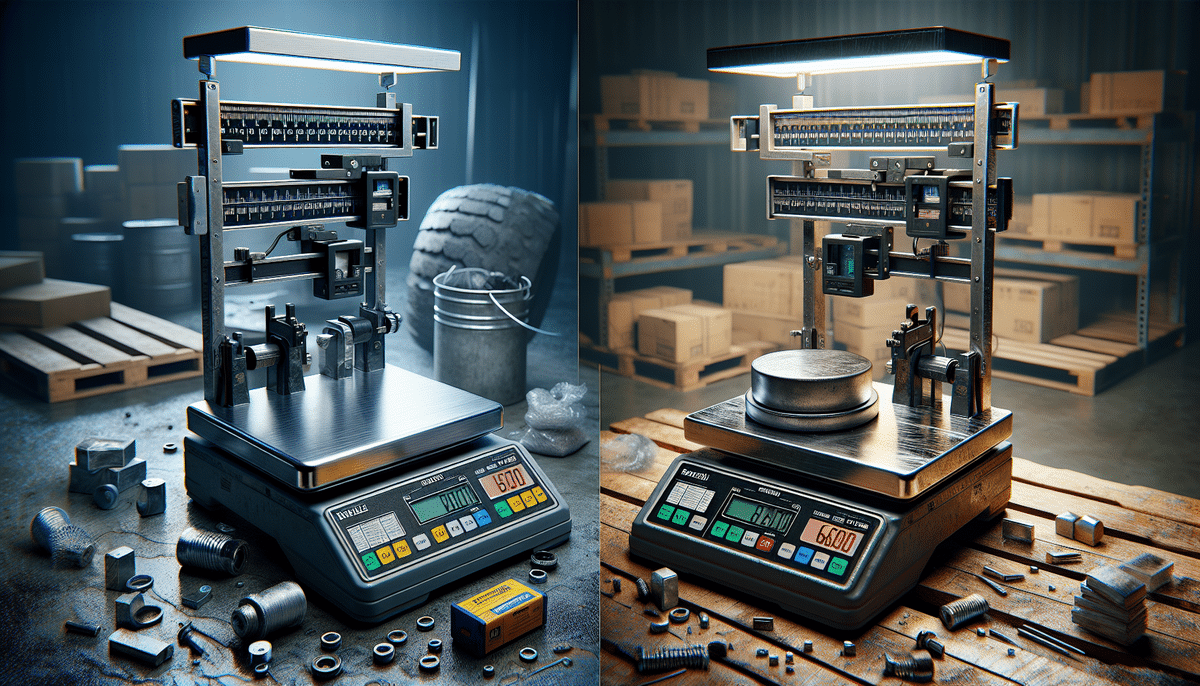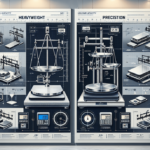Mettler Toledo BC-60 vs Angel USA Extra Large Platform
Choosing the right weighing scale is crucial for businesses that rely on accurate measurements for operations such as measuring ingredients, weighing packages, or monitoring production outputs. Two leading models in the market are the Mettler Toledo BC-60 and the Angel USA Extra Large Platform. This comprehensive comparison explores their key features, benefits, limitations, and user feedback to help you make an informed decision.
Introduction: The Importance of Selecting the Right Weighing Scale
Selecting the appropriate weighing scale begins with understanding your business’s specific needs. Consider the following:
- Are you measuring small items or large packages?
- Do you need a portable scale or a stationary one?
- What level of accuracy and precision is required for your tasks?
Answering these questions narrows down your options and ensures you choose a scale that aligns with your operational requirements.
Key factors to consider include the capacity and durability of the scale. Ensure the scale can handle the weights you intend to measure to avoid inaccurate readings and potential damage. Additionally, a durable scale is essential, especially in harsh environments, to ensure longevity and cost-effectiveness.
Mettler Toledo BC-60: Features, Benefits, and Limitations
The Mettler Toledo BC-60 is a high-precision weighing scale designed for industrial applications. Key features include:
- Easy-to-read LCD display
- Stainless steel weighing pan
- Robust construction with a capacity of up to 150 kilograms
- Rechargeable battery providing up to 50 hours of use
- Advanced calibration capabilities
One of the primary benefits of the BC-60 is its accuracy and precision, capable of measuring weights within 0.1 grams. This high level of precision is ideal for applications requiring exact measurements, such as laboratory settings or quality control in manufacturing.
Despite its advantages, the BC-60 has some limitations. Its higher price point may be a barrier for smaller businesses or startups. Additionally, users have reported that proper calibration and regular maintenance are essential to maintain its accuracy, which can require additional time and resources.
However, the BC-60 compensates with its durability. Constructed from stainless steel, it is resistant to corrosion and built to withstand harsh industrial environments, making it a reliable long-term investment.
Angel USA Extra Large Platform: Features, Benefits, and Limitations
The Angel USA Extra Large Platform is another robust option tailored for industrial use. Its standout features include:
- Large, clear LCD display
- Spacious weighing platform with a capacity of up to 600 pounds
- Rugged steel construction
- Built-in counting function for high-volume measurements
- Non-slip surface for enhanced safety
A major benefit of the Angel USA scale is its affordability, making it accessible to smaller businesses with budget constraints. Its user-friendly interface allows for easy operation, suitable for diverse users without extensive training.
However, the Angel USA scale may not offer the same level of accuracy and precision as the BC-60, particularly when measuring smaller weights. Additionally, its larger size can impact portability, making it less ideal for businesses that require frequent relocation of the scale.
The scale's durability is commendable, with a heavy-duty construction capable of withstanding continuous use and heavy loads, although it may lack some of the advanced features found in more expensive models.
Comparison: Accuracy and Precision
In terms of accuracy and precision, the Mettler Toledo BC-60 outperforms the Angel USA Extra Large Platform. The BC-60 can measure weights with an accuracy of 0.1 grams, making it suitable for tasks that require high precision. On the other hand, the Angel USA scale has a minimum readability of 0.5 pounds, which may be sufficient for general industrial use but less ideal for precise applications.
According to industry standards, precision scales like the BC-60 are essential in environments where measurement accuracy directly impacts product quality and compliance with regulatory standards (NIH Study on Scale Precision).
While the BC-60 offers superior precision, the Angel USA scale compensates with a higher capacity, handling up to 600 pounds compared to the BC-60's 150 kilograms (Scale Capacity Guide). This makes the Angel USA scale more versatile for heavy-duty applications.
Price is another critical factor. The BC-60's advanced features and precision come at a higher cost, whereas the Angel USA scale provides a cost-effective solution for businesses that do not require such high levels of accuracy.
User-Friendly Features and Ease of Use
Both the Mettler Toledo BC-60 and the Angel USA Extra Large Platform are designed with user-friendliness in mind:
- BC-60: Features a simple keypad interface for quick data input and a rechargeable battery lasting up to 50 hours, enhancing portability and ease of use.
- Angel USA: Comes with a comprehensive user manual, clear setup instructions, and an intuitive interface that simplifies operation for all users.
In addition to their interfaces, both scales boast high durability. The BC-60’s stainless steel platform resists corrosion and is easy to clean, while the Angel USA scale’s heavy-duty steel construction ensures it withstands frequent use and heavy loads.
Moreover, both scales provide essential features such as accurate measurements and stable platforms, ensuring reliable performance across various applications.
Portability and Durability: Making the Right Choice
When evaluating portability and durability, both scales offer impressive features, but they excel in different areas:
- Mettler Toledo BC-60: Its lightweight design and rechargeable battery make it highly portable, ideal for businesses that require frequent relocation of their weighing equipment.
- Angel USA Extra Large Platform: While less portable due to its larger size, it offers exceptional durability with a heavy-duty steel construction capable of handling weights up to 600 pounds.
Additional unique features include:
- BC-60: Large, easy-to-read display suitable for precise measurements up to 150 kilograms.
- Angel USA: Non-slip surface enhances safety and versatility, making it suitable for various applications such as weighing pets and luggage.
Ultimately, the choice between portability and heavy-duty durability depends on your specific business requirements.
Pricing Comparison: Value Proposition of Both Scales
The Mettler Toledo BC-60 commands a higher price compared to the Angel USA Extra Large Platform. This premium cost is justified by the BC-60’s enhanced accuracy, precision, and durable build, making it a worthwhile investment for businesses that prioritize high-quality measurements and require reliable, long-term equipment.
In contrast, the Angel USA scale offers a more budget-friendly option without compromising essential features. It provides excellent value for businesses with tighter budgets or those that do not need the highest levels of precision.
For cost comparisons and budgeting, consider consulting detailed pricing guides and product reviews from industry experts (Weighing Scale Price Guide).
Customer Reviews and Feedback
Customer feedback provides valuable insights into the reliability and performance of weighing scales:
Mettler Toledo BC-60
Users generally praise the Mettler Toledo BC-60 for its accuracy, durability, and ease of use. Many appreciate the precise measurements and the robust construction that withstands industrial use. However, some users note that the calibration process can be time-consuming and may require periodic adjustments to maintain accuracy.
Angel USA Extra Large Platform
Feedback on the Angel USA Extra Large Platform is predominantly positive, highlighting its affordability, simplicity, and versatility. Users find it easy to operate and suitable for a wide range of applications. On the downside, some reviewers have reported inconsistencies in readings, particularly when measuring smaller items, which can affect overall reliability.
Conclusion: Determining the Best Fit for Your Business
The decision between the Mettler Toledo BC-60 and the Angel USA Extra Large Platform hinges on your business’s specific needs and budget:
- Mettler Toledo BC-60: Best suited for businesses that require highly precise measurements and a portable design. Its higher cost is offset by superior accuracy and durability.
- Angel USA Extra Large Platform: Ideal for businesses that prioritize affordability and simplicity. It offers robust performance for general industrial use without the premium price tag.
Regardless of your choice, ensure regular calibration and maintenance to maintain accuracy and extend the lifespan of your weighing scale.
The Pros and Cons of Investing in a High-Quality Weighing Scale
Investing in a high-quality weighing scale brings numerous advantages:
- Accuracy and Precision: Reliable measurements reduce waste and ensure consistency in operations.
- Durability: High-quality scales are built to last, offering a better return on investment over time.
- Advanced Features: Connectivity options, built-in counting functions, and clear displays enhance operational efficiency.
However, these benefits come with a higher initial cost, which may not be feasible for all businesses. It’s essential to balance the benefits against the cost to determine if a high-quality scale aligns with your business’s financial and operational needs.
How to Choose the Right Weighing Scale for Your Business Needs
Selecting the right weighing scale for your business involves careful consideration of several factors:
- Type of Items: Assess the size and weight range of the items you’ll be measuring to determine the necessary capacity.
- Accuracy and Precision: Evaluate the level of precision required for your tasks to ensure the scale meets your standards.
- Portability: Decide whether a stationary or portable scale is more suitable based on your operational workflow.
- Features: Look for features that align with your business needs, such as connectivity options or built-in counting functions.
- Budget: Establish a budget that balances cost with the necessary features and quality to ensure you get the best value for your investment.
Additionally, reviewing product specifications and customer feedback can provide further insights into the reliability and user-friendliness of potential models. This comprehensive approach ensures that you select a weighing scale that effectively supports your business operations.
Understanding the Differences Between Analytical Balances, Precision Balances, and Industrial Scales
Different types of weighing scales serve various purposes, each with unique features and benefits:
- Analytical Balances: These scales are designed for highly precise measurements, typically used in laboratory settings. They offer high accuracy with limited capacity, making them ideal for small-scale measurements.
- Precision Balances: Suitable for general use, precision balances provide accurate readings across a broader range of weights compared to analytical balances. They are commonly used in quality control and manufacturing environments.
- Industrial Scales: Industrial scales are built for heavy-duty tasks, such as weighing large packages or monitoring production outputs. They offer high capacity and durability but may compromise on precision compared to precision or analytical balances.
Understanding these differences is crucial for selecting a scale that best fits your business’s specific requirements, ensuring optimal performance and reliability in your weighing tasks.
Additional Resources
For more information on selecting the right weighing scale, consider consulting industry reports and academic studies:
- World Health Organization (WHO) Guidelines on Scale Use
- National Center for Biotechnology Information (NCBI) Publications
- Mettler Toledo Official Website
- Angel USA Official Website
Ensuring Optimal Performance and Longevity of Your Weighing Scale
To maximize the performance and lifespan of your weighing scale, follow these best practices:
- Regular Calibration: Periodically calibrate your scale to maintain accuracy and reliability in measurements.
- Proper Maintenance: Keep the scale clean and free from debris. Inspect regularly for any signs of wear or damage.
- Correct Usage: Adhere to the manufacturer’s guidelines regarding weight limits and operational procedures to prevent damage.
- Secure Placement: Ensure the scale is placed on a stable, level surface to avoid inaccurate readings and potential tipping.
By following these guidelines, you can ensure that your weighing scale continues to deliver precise and reliable measurements, supporting your business operations effectively.




















